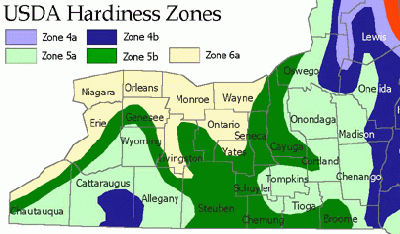Difference between revisions of "Western and Central New York"
(Created page with "DEC Regions 7, 8, and 9 The geographic focus of this site is Western and Central New York (DEC Regions 7, 8, and 9). ''' Region 7 '''...") |
|||
| (5 intermediate revisions by the same user not shown) | |||
| Line 1: | Line 1: | ||
[[File:DEC Regions.png|500px|thumb|right|DEC Regions 7, 8, and 9]] | [[File:DEC Regions.png|500px|thumb|right|DEC Regions 7, 8, and 9]] | ||
| − | The geographic focus of this site is Western and Central New York | + | The geographic focus of this site is Western and Central New York, including the Finger Lakes Region, specifically [[Department of Environmental Conservation|DEC Regions 7, 8, and 9)]]. This is roughly the western half of "Upstate New York", and does not include the Adirondack or Hudson Valley regions. |
| − | + | == Climate == | |
| − | |||
| − | + | New York has a temperate climate. | |
| − | |||
| − | + | Winters are marked by "Lake Effect" from both [[Lake Erie]] and [[Lake Ontario]], especially when the lakes are predominantly unfrozen, picking upp moisture and precipitating heavy snow in relatively narrow East-to-West stretching regions called "snow bands". | |
| − | " | ||
| − | [ | + | === USDA Plant Hardiness Zones === |
| + | |||
| + | [[File:Zonelg.gif|400px|thumb|right|USDA Hardiness Zones for Western and Central New York]] | ||
| + | |||
| + | USDA Hardiness Zones for DEC Regions 7, 8, and 9 vary from Zones 4a to 6a, which represent average annual minimum temperatures as follows: | ||
| + | |||
| + | * '''Zone 4a''': -30 to -25 F (-31.7 to -34.4 C) | ||
| + | * '''Zone 4b''': -25 to -20 F (-28.9 to -31.6 C) | ||
| + | * '''Zone 5a''': -20 to -15 F (-26.2 to -28.8 C) | ||
| + | * '''Zone 5b''': -15 to -10 F (-23.4 to -26.1 C) | ||
| + | * '''Zone 6a''': -10 to -5 F (-20.6 to -23.3) | ||
| + | |||
| + | |||
| + | == Geology == | ||
| + | {{Help}} | ||
| + | |||
| + | === Niagara Escarpment === | ||
| + | |||
| + | === Finger Lakes === | ||
| + | |||
| + | === Allegheny Foothills === | ||
Latest revision as of 21:32, 22 January 2011
The geographic focus of this site is Western and Central New York, including the Finger Lakes Region, specifically DEC Regions 7, 8, and 9). This is roughly the western half of "Upstate New York", and does not include the Adirondack or Hudson Valley regions.
Contents
Climate
New York has a temperate climate.
Winters are marked by "Lake Effect" from both Lake Erie and Lake Ontario, especially when the lakes are predominantly unfrozen, picking upp moisture and precipitating heavy snow in relatively narrow East-to-West stretching regions called "snow bands".
USDA Plant Hardiness Zones
USDA Hardiness Zones for DEC Regions 7, 8, and 9 vary from Zones 4a to 6a, which represent average annual minimum temperatures as follows:
- Zone 4a: -30 to -25 F (-31.7 to -34.4 C)
- Zone 4b: -25 to -20 F (-28.9 to -31.6 C)
- Zone 5a: -20 to -15 F (-26.2 to -28.8 C)
- Zone 5b: -15 to -10 F (-23.4 to -26.1 C)
- Zone 6a: -10 to -5 F (-20.6 to -23.3)
Geology
| We Need Your Help!
This page could use more useful information. Please consider editing it and adding facts, details, or other contributions. |


